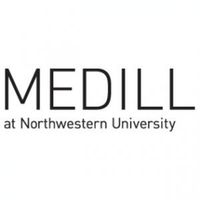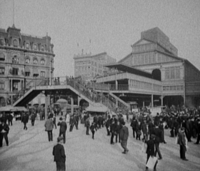Think of this as Volume 17, Number 30 of the newsletter I have written weekly since March, 1997. Enjoy.
The difference between a journalist and
a blogger is a paycheck.

Medill School of Journalism, back in 1977, was that “a journalist
is someone who works for someone who buys ink by the barrel.” That
was later updated to “a journalist is someone who works for someone
who buys bandwidth by the gigabit.” Although the last should be
amended, since most web sites are not journalistic enterprises.
The key phrase above is “works for
someone.” A journalist is someone who works for someone. They're an
employee. They get a pay check, maybe benefits and a retirement plan.
They are subject to ethics imposed by their employer. The employer
can pull their press card at any time. The journalist, in other
words, is under the publisher's control. And the publisher is subject
to business ethics, not journalistic ones.

A blogger could be many things. They could be a freelancer, like me,
an independent contractor, a typewriter for hire. They could be an
amateur, someone who is practicing journalism in their community as a
sideline, solely to benefit their community. Or they could be a
publisher, someone who is starting a business around a beat using the
blog metaphor. Examples of this include Gigaom and Talking Points
Memo, both of which have become substantial businesses.
The point is that the blogger works for
himself. He is a free agent. He is beyond an employer's control. He
or she may in fact become an employer.
This makes them hard for government to
control.
When the Department of Justice recently
decided to clarify and limit its proposed prosecution of journalists,
this shield only covered employees, not freelancers, and certainly
not amateurs. Thus it wasn't really a shield. It was instead a cozy
relationship offered to certain favored employers.
But in a way, that's OK. Because, ever
since the Web was spun, journalism has been re-inventing itself, as a
business and not a profession.

stories like this one which bemoan the future of freelancing. (I've been a successful freelancer for 30 years.) Or this one, from former
reporter Dan Lyons,
saying he can't make money as a writer any more and he's going into
PR. (People have been doing this for a century. There's no shame in it.)
Really, Dan? I've been making money in
online journalism since 1985. This may be my best year ever. The
difference is that I don't expect to make big money, while you do. So
don't go calling your greed principle, sir. It's just principal, and
interest, that interests you.
What's actually happening is that
journalism is returning to its 19th century, pre-Pulitzer
roots, when papers were small, staffs were smaller, and the incentive
to get a “scoop” was for the immediate pop of sales. Back then
there was a direct connection between the daily work product and the
bottom line. That was lost in the 20th century. It's
ba-a-ck.

before. Sites that began as blogs are becoming full-fledged news
operations with paid staffs, like Gigaom and TalkingPointsMemo.
They're doing it the old-fashioned way, by being in very close touch
with both their business partners (sometimes called advertisers ) and
readers.
Om Malik started Gigaom in 2001 to
cover what was called “web 2.0,” the wreckage of the dot-bomb
that eventually became the social media and mobile booms we see
today. He has built it into a top property by hiring experts who were
passionate in related areas of technology.
A good example is Katie Fehrenbacher,
who mainly focuses on green technology but has also worked on other
areas, like mobile. In addition to writing, she hosts conference sessions for
Malik. Like generations of reporters before her, she has made herself into a
minor celebrity, focused on her credibility as a clear-eyed analyst
of the stories she's done. (I am a fan.)
Josh Marshall launched TPM in 2000,
after falling out with his editors at The American Prospect, a
liberal magazine, and has since turned the blog into one of the best
political reporting sites around. He won a Polk Award for his
coverage of the U.S. Attorneys scandal in 2007 and by 2009 was
considered one of the most powerful people in Washington by GQ
Magazine, even though he's based in New York.
Marshall now regularly hires other
journalists,
having launched a D.C. Office in 2010 under David Kurtz.
As the article quoted here suggests, other D.C. News organizations
don't really know what to make of it, some calling it just an
“opinion journal, ” but the key to the story is what Marshall
himself says. “There are still very few organizations that do what
we do, and there's almost no track record for it. We have to evaluate
people for a job they haven't done before.”

since 1985, when I joined Newsbytes. The key to success is being able
to get lots of stuff out fast. That's what the job was in the 1870s,
when New York's media was centered a few blocks from City Hall, in a
set of buildings on“Park Row.” This was a collection of offices where the newspapers of that time
fought tooth-and-nail for scoops and scraps, eventually building the
20th century newspaper model.
But in the early days it was anything
but staid. As the 1952 film “Park Row” dramatizes,
a bunch of guys fired from one paper could quickly launch another.
Freelancers were paid a pittance, many working just for the chance to
show what they could do, and salaries were low enough that most
reporters lived among the people they covered.
As the industry grew fat this changed,
and that has been its downfall. The idea that a reporter is a wealthy
celebrity who is as important as any other player in a business or
industry is ludicrous, but that's what people have come to expect,
mainly because newspaper reporters who knew where the money was
became TV people, starting in the 1970s, when I was in journalism
school.

While there is now full-throated
competition on a national stage, in the online media, with
technology, finance and politics all sporting several competing
titles, this is not yet true on a local level, and that is where the
greatest opportunities lie. Academics are studying these markets like
petri dishes, expecting newspaper chains to emerge, or merge into the
new medium.
That isn't going to happen. Not for a
long time. It took decades for the 19th century press to
become corporatized, and national. It will take decades again.
Any successful publication starts, not
with readers, not with stories, but with markets. Real journalism is,
and always has been, an exercise in market-making. The best targets
for ads remain extrinsic targets – targets based on the content of
the page – rather than intrinsic targets – targets based on
assumptions about readers. That's true because readers focus on
markets only when they're looking at content that reflects a market.
They care about local when reading local content, politics when
reading political content, finance when reading financial content.
If you can prove that you reach a
market, any market, you can sell access to your readers for a
premium. This is how TheStreet.Com works, and they pay me handsomely
for my work. This is how Motley Fool works, and they pay handsomely
for my work. It's how ZDNet worked when I worked there, and I did
very well for several years there as well. It's not magic.
Demonstrate to someone who is selling that you have his buyers, and
they will do business with you.

view of journalists is like studying a pig based on what comes out of
his rear end. You want to look at the whole mechanism, and when it
comes to journalism that mechanism is a business, not a profession.
Online journalism has been a great life
for me, and it can be a great one for you if you're still in school.
Just remember to study business as well as writing, to consider
yourself a brand and not just a commodity, and to protect your
credibility account, building it every day through truth-telling and
working with the very best people you can.
Do that and you'll go far.











Agree with your points about this difference. But I also think that good blogger comes (starts) from a journalist 🙂
Agree with your points about this difference. But I also think that good blogger comes (starts) from a journalist 🙂
Thank you for the information, it helped me a lot.
Thank you for the information, it helped me a lot.